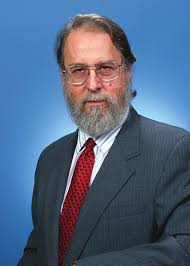 Lee J Rickard (Photo courtesy of NRL)
Lee J Rickard (Photo courtesy of NRL)
Lee J Rickard
Prepared by Kenneth I. Kellermann, with contributions from Patricia Henning, Jackie Fischer, and Ellen Bouton
Lee J Rickard was born 24 December 1949 in and died in September 2017. He received his BS in physics from University of Miami in 1965, and his MS from University Chicago in 1972. He continued graduate work at Chicago with Pat Palmer and received his PhD in 1975 for a dissertation on "Extragalactic Carbon Monoxide." Following his graduate work, Lee J accepted a post-doc position at NRAO in October 1975 and later joined the NRAO staff as an Assistant Scientist in 1977. In 1980 he joined the faculty of Howard University, and later Lee J went to the University of New Mexico where he became the Project Manager for the UNM Low Frequency Array.
Lee J joined the Naval Research Laboratory in the mid-1980s where he was called upon to lead the Optical/IR/Radio Sensing branch as Branch Head. As a staunch believer in the ability of basic science to contribute to the national treasure, and utilizing his broad knowledge and research in the area of instrumental physics, he helped the Laboratory define the state of the art in powerful techniques such as Optical and Radio Interferometry and Hyperspectral Remote Sensing. Under his direction as Branch Head, the Navy Prototype Optical Interferometer pioneered astronomical interferometry, the Very Large Array was outfitted with VHF receivers (74 MHz) and became the world's most powerful radio interferometer operating below 150 MHz, and a very successful hyperspectral remote sensing program was begun. Later, as Division Head of the Remote Sensing Division, Lee J oversaw and participated in research and development in the fields of Astronomy and Astrophysics, Oceanography, and Atmospheric Science. In both leadership roles, Lee J's breadth of expertise and supportive and inclusive leadership style fostered a unique blend of individual dedication and team spirit.
Throughout his career, Lee J's research centered on radio studies of molecular gas and infrared studies of infrared dust emission and dust properties in the Galaxy and in other galaxies. Lee J held a strong personal belief in the importance of scientific inquiry, and was active in the Committee for Skeptical Inquiry, an organization concerned with science versus non-scientific claims. He loved history, both ancient (e.g. Roman) and more modern (Abraham Lincoln and the Civil War). He was cultured - a man of literature who enjoyed classics like Moby Dick. He was remembered at UNM for walking to work with book in hand, whatever he happened to be reading at the time.
He was also a fine singer and had a deep, resonant, low bass voice. He sang with the Cathedral Choir of St. John Episcopal in Albuquerque. He performed "Man of la Mancha" at the St. Andrew's Episcopal Church in Arlington, VA, in June 2006 with his 2 sons. While in the Washington DC area, he sang with the Paul Hill Chorale and with the Choral Arts Society at Wolf Trap.
Lee J was adamant in his correspondence with friends and colleagues that there was no period in his name after the 'J'
![[IAU logo]](iau_wb_thumb.jpg)
![[URSI logo]](URSI-logo-thumb.jpg)
![[Karl Jansky at his antenna]](jansky_photo_02_thumb.jpg)
![[Reber's Wheaton antenna]](Reber_Telescope_Wheaton_thumb.jpg)
![[Dover Heights]](Dover_Heights_02_thumb.jpg)
![[4C telescope]](GB61-195_4C_telescope_thumb.jpg)
![[Ewen and horn antenna]](ewen_horn1s.jpg)
![[Dwingeloo, 1956]](Dwingeloo-1956-thumb.jpg)
![[Jocelyn Bell Burnell and Cambridge antenna used in pulsar discovery]](burnell2_thumb.jpg)
![[Lovell Telescope at Jodrell Bank]](site_1594_0001-500-334-20180316163019-thumb150.jpg)
![[Wilson, Penzias, and Bell Labs horn antenna]](wilson-penzias-horn_thumb.jpg)
![[6-m Millimeter Radio Telescope in Mitaka, Japan]](6m-thumb.jpg)

